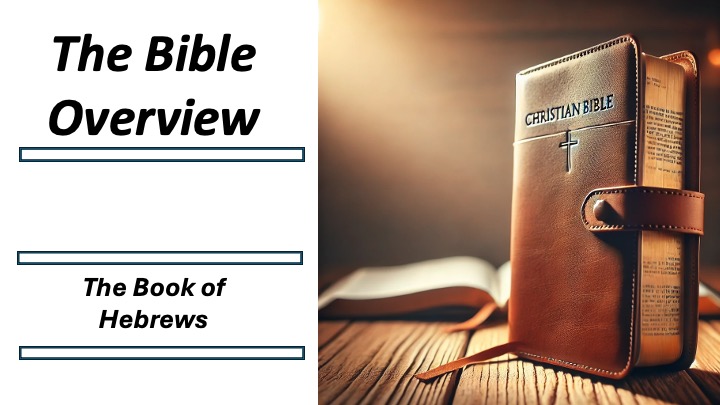Bible Overview Hebrews
Mike Ervin

Comprehensive Overview of the Book of Hebrews
1. Authorship
Traditional View:
The authorship of Hebrews has been debated since the early church. Traditionally, Paul was considered the author due to its theological depth and similarities in themes with his epistles. Some early church fathers, such as Clement of Alexandria and Origen, acknowledged Pauline influence but noted stylistic differences. The King James Version even attributes Hebrews to Paul, but this view has been largely questioned.
Modern Scholarly View:
Most modern scholars reject direct Pauline authorship due to differences in vocabulary, writing style, and argumentation. Several alternative candidates have been proposed:
• Apollos – A learned Alexandrian Jew (Acts 18:24-28) who was eloquent and knowledgeable in the Scriptures.
• Barnabas – A close associate of Paul and a Levite, possibly familiar with the book’s focus on Jewish worship and priesthood.
• Luke or Clement of Rome – Both had ties to Pauline theology and Greek rhetorical style.
• Priscilla – Some suggest that Priscilla (along with Aquila) may have authored Hebrews, explaining why the author remained anonymous in a male-dominated society.
Ultimately, the identity of the author remains unknown, and as Origen famously stated: “Only God knows who wrote Hebrews.”
2. Date of Authorship
Traditional View:
Early church tradition places Hebrews in the first century, often alongside Paul’s writings, suggesting a pre-70 CE date.
Modern Scholarly View:
Scholars propose a date between 60–95 CE, with arguments centering on:
• Pre-70 CE Arguments: The destruction of the Jerusalem Temple (70 CE) is not mentioned, despite the book’s focus on the sacrificial system. If written after the temple’s fall, the author likely would have referenced it as evidence of the obsolescence of the old covenant.
• Post-70 CE Arguments: Some suggest that Hebrews was written after the temple’s destruction but avoids mentioning it because it is already irrelevant in the author’s theological framework. Others suggest a later date due to early citations by Clement of Rome (c. 96 CE).
3. Main Themes
• The Superiority of Christ: Hebrews presents Jesus as superior to angels, Moses, the Levitical priesthood, and the Old Testament sacrifices.
• Christ as High Priest: Unlike the temporary Levitical priests, Jesus is the eternal high priest in the order of Melchizedek, offering a once-for-all sacrifice.
• Faith and Perseverance: The “Hall of Faith” (Hebrews 11) highlights the necessity of enduring faith.
• Warning Passages: Hebrews warns against apostasy and encourages steadfastness in the faith.
• The New Covenant: Christ establishes a better covenant, fulfilling and surpassing the old Mosaic system.
4. Sequential Summary of Chapters
Chapters 1–2: The Superiority of Christ Over Angels
• Christ is greater than angels and is the divine Son of God.
• Jesus, though fully divine, became human to bring salvation.
Chapters 3–4: Christ Is Greater Than Moses
• Moses was faithful as a servant; Christ is faithful as a Son over God’s house.
• The Israelites failed to enter God’s rest due to unbelief; believers must strive to enter God’s true rest.
Chapters 5–7: Christ as the Perfect High Priest
• Christ is a high priest in the order of Melchizedek, superior to the Levitical priesthood.
• The priesthood of Christ is eternal, unlike the temporary priesthood of Aaron.
Chapters 8–10: The New Covenant and Christ’s Once-for-All Sacrifice
• The Old Covenant, with its temple rituals, is obsolete.
• Christ’s sacrifice is superior, once for all, unlike repeated animal sacrifices.
• Believers have direct access to God through Christ.
Chapters 11–12: Faith and Endurance
• Hebrews 11 recounts examples of faith from Abel to the prophets.
• Hebrews 12 urges believers to run the race with endurance, fixing their eyes on Jesus.
• God disciplines His children for their good.
Chapter 13: Exhortations and Conclusion
• Final moral and practical instructions (hospitality, marriage, avoiding greed).
• Encouragement to remain faithful to Christ and Christian leadership.
• A closing benediction and farewell.
5. Conclusion: The Importance of Hebrews
Hebrews is a rich theological masterpiece that bridges the Old and New Testaments, presenting Christ as the fulfillment of God’s promises. It encourages believers to persevere in faith, drawing near to God with confidence. Its emphasis on Jesus’ high priesthood and the new covenant remains foundational for Christian theology today.